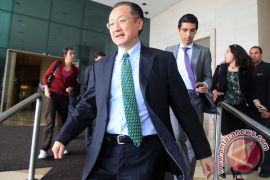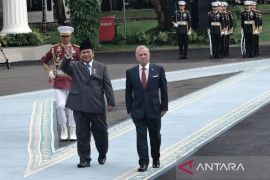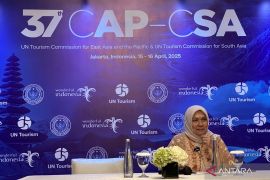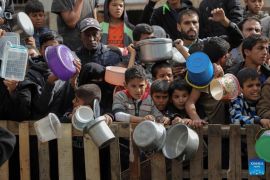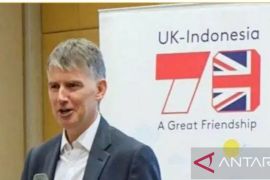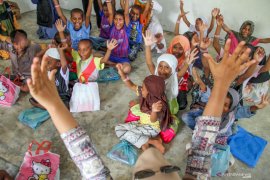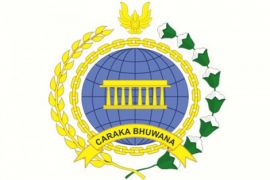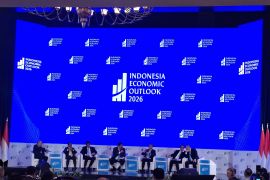South Korea-born, US-raised Kim instead has Harvard degrees in medicine and anthropology, and a strong record in developing programs to fight diseases like HIV/AIDS and tuberculosis in poor countries.Wahington (ANTARA News/AFP) - The World Bank chose Korean-American physician Jim Yong Kim as its next chief Monday in a decision that surprised few but took beating an unprecedented challenge to the US lock on the Bank`s presidency.
The Bank picked the 52-year-old US health expert and educator over Nigerian Finance Minister Ngozi Okonjo-Iweala amid rising pressure from emerging and developing countries for the huge development lender to recruit one of their own for a leader.
Kim, the president of the Ivy League university Dartmouth College, will succeed outgoing president Robert Zoellick, a former US diplomat who is departing in June at the end of his five-year term.
After the first-ever open fight for the job, the Bank`s directors expressed "deep appreciation" to Kim, Okonjo-Iweala and a third candidate, Colombian economist Jose Antonio Ocampo, who withdrew from the race Friday.
"Their candidacies enriched the discussion of the role of the president and of the World Bank Group`s future direction," the Bank said in a statement.
"The final nominees received support from different member countries, which reflected the high caliber of the candidates."
The US nomination of Kimhad surprised many, as he was little known outside global health circles and has no background in development economics.
It also broke the pattern of the 11 American bankers and diplomats who have held the job before him.
South Korea-born, US-raised Kim instead has Harvard degrees in medicine and anthropology, and a strong record in developing programs to fight diseases like HIV/AIDS and tuberculosis in poor countries.
The position is crucial for much of the developing world. The president oversees a staff of 9,000 economists and policy specialists, and portfolio of loans for development projects that hit $258 billion in 2011.
In a statement from Lima, Peru, on Monday, Kim pledged to "seek a new alignment of the World Bank Group with a rapidly changing world."
"It was here in the shantytowns of Lima that I learned how injustice and indignity may conspire to destroy the lives and hopes of the poor," he said.
"It was here that I saw how communities struggle to prosper because of a lack of infrastructure and basic services... And it was here that I learned that we can triumph over adversity by empowering the poor and focusing on results."
There had been little doubt about the Bank`s choice of Kim. By a longstanding pact Washington has chosen the head of the World Bank while Europe has held control of who leads its sister institution, the International Monetary Fund.
On Friday Ocampo pulled out, saying the decision would be made on politics and not merit.
After Kim was named Monday, Okonjo-Iweala also blasted the "long-standing and unfair tradition" for choosing a Bank head.
"It is clear to me that we need to make it more open, transparent and merit-based. We need to make sure that we do not contribute to a democratic deficit in global governance."
Development activists applauded the choice, while regretting the appearance of a pre-ordained result.
The Health Global Access Project called Kim a "transformative figure in global health" who could bring sweeping change to the Bank.
They said his successful campaign to scale up access to AIDS treatment in Africa took place "at a time when so-called experts in development -- including the World Bank -- argued that it was neither feasible nor cost-effective."
US Treasury Secretary Timothy Geithner said Kim will bring a fresh perspective to the Bank.
"His deep development background coupled with his dedication to forging consensus will help breathe new life into the World Bank`s efforts to secure fast economic growth that is widely shared."
But the global development agency Oxfam called the selection process a "sham" even as it praised Kim.
"Dr. Kim is an excellent choice for World Bank president and a true development hero," said Oxfam`s Elizabeth Stuart.
"But we`ll never know if he was the best candidate for the job, because there was no true and fair competition."
Peter Chowla of the Bretton Woods Project, which monitors World Bank work, called the decision "a stitch-up between the US and Europe."
"This will further erode the Bank`s legitimacy unless Kim starts listening closely to developing countries and critics of the World Bank, and begins a process of fundamental reform."(*)
Editor: Heru Purwanto
Copyright © ANTARA 2012
